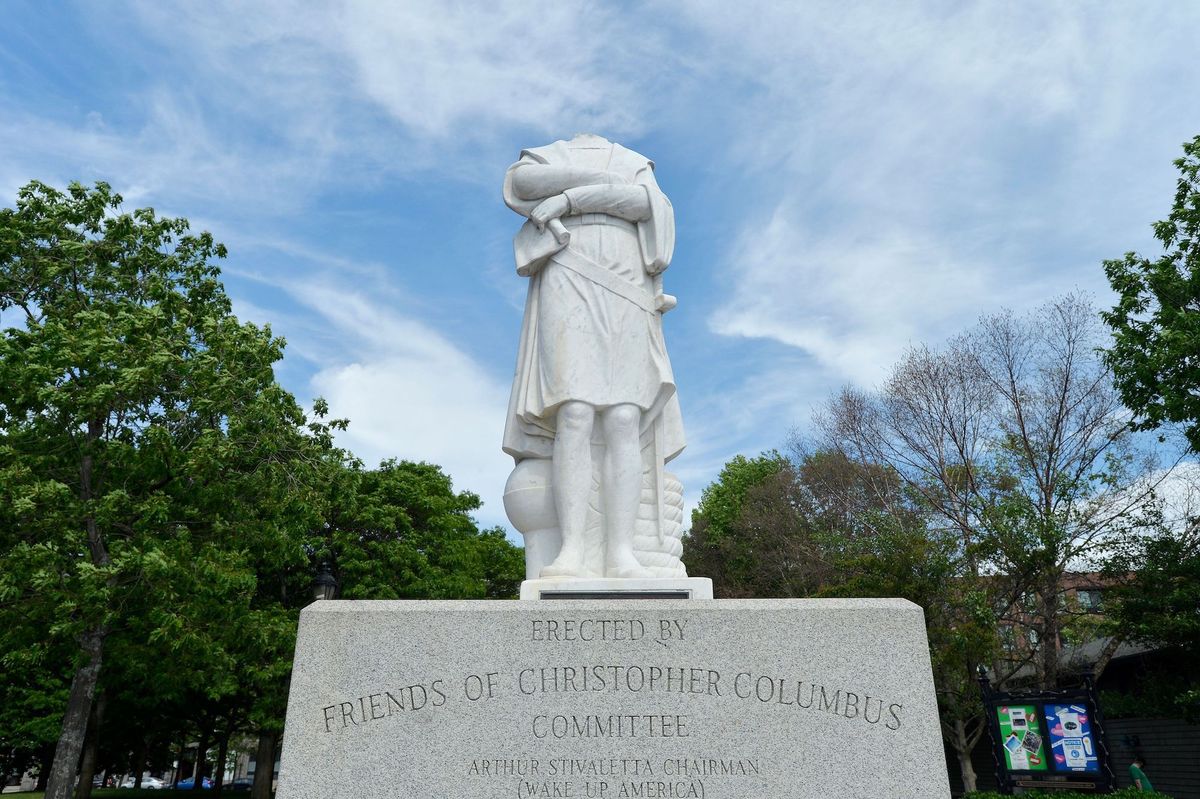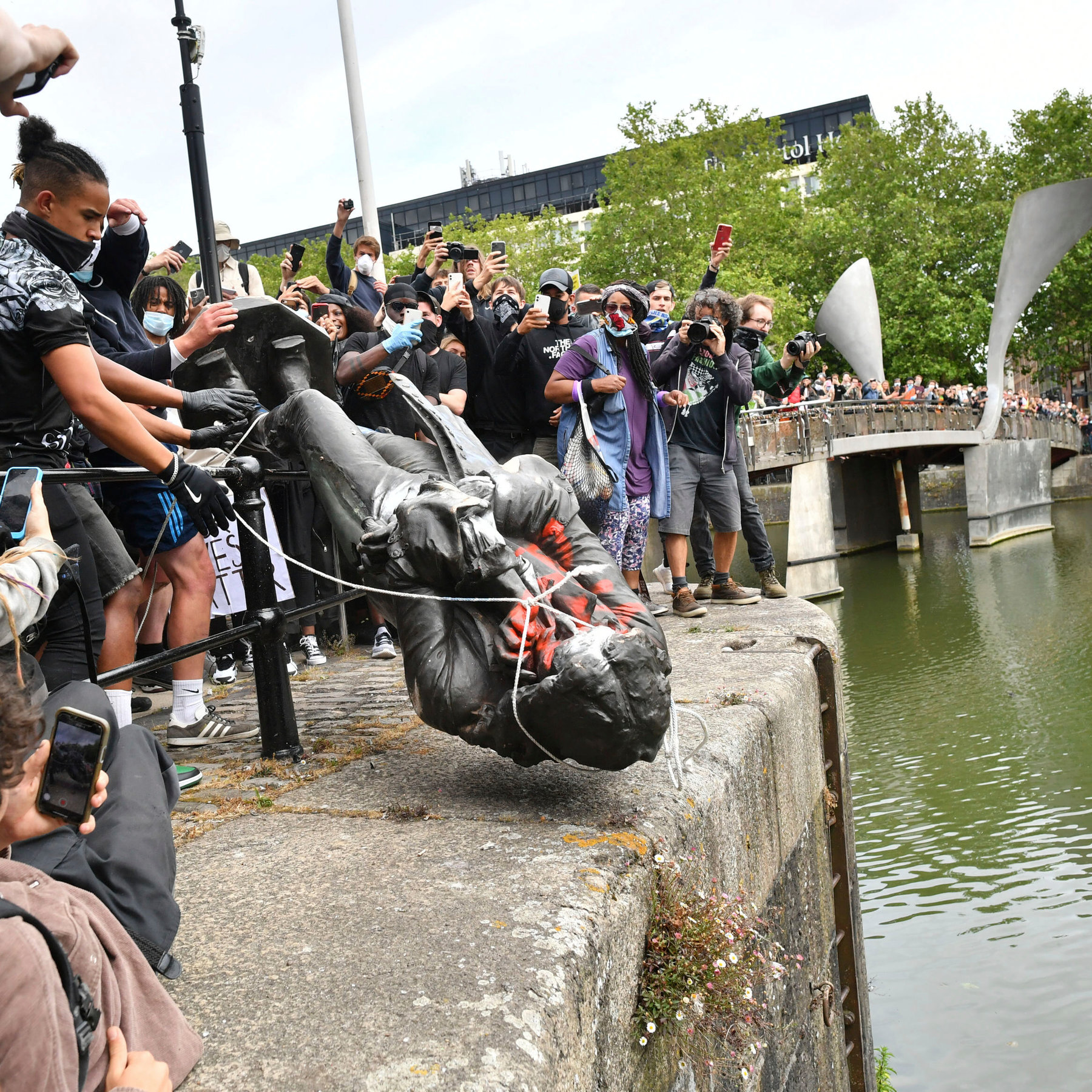Does tearing down statues restore morality or is it an ideological purge?

A few minutes every morning is all you need.
Stay up to date on the world's Headlines and Human Stories. It's fun, it's factual, it's fluff-free.
On June 26, President Trump signed an executive order instructing law enforcement officials to prosecute those who damage or destroy statues, monuments and religious iconography “to the fullest extent permitted under Federal law.”
The order comes in response to protesters across the country who have torn down and defaced statues, most particularly statues of those linked to slavery. While many of the statues that have been targeted are of Confederate generals or soldiers involved in the American Civil War, others have also been targeted.
In Wisconsin, one of the statues torn down by protesters was that of Hans Christian Heg, a Norwegian-born anti-slavery activist who fought and died on the side of the Union. A statue of Ulysses S. Grant, the renowned Union general who later became president, was also torn down.
Despite leading the Union army and coming from an abolitionist family, Grant was involved with slave ownership through marriage with his wife, Julia Grant, whose family had a slave-run plantation in Missouri. Monuments outside of the Lincoln Memorial were also defaced.
Attempts were also made to topple the statue of Andrew Jackson, the seventh president of the United States. Jackson was a slave owner and the architect of the US government’s forced removal of some 100,000 Native Americans off their customary lands, now known as the “Trail of Tears.”
Four men have been prosecuted by the US Department of Justice for attempting to remove the state of Jackson.
Overall, the response to these events has been mixed. Some have called protesters’ efforts to remove statues brave attempts to push back against the institutionalized lionizing of individuals who engaged in morally repugnant acts.
Others claim that protesters are taking things too far.
Lori Lightfoot, the mayor of Chicago, stated earlier this month that she does not support removing statues in the city, including that of Christopher Columbus, the Italian explorer famed for spearheading European settlements in the Americas. Columbus also notoriously exploited indigenous populations.
“We can use this moment as an opportunity to not try to erase history but embrace it full on,” Lightfoot said. “[Instead of tearing statues down] let’s have honest, hard conversations about the real truth of our history.”

Reckoning in higher education
In related cultural debates, a number of universities and other institutions around the country are reassessing the naming of their buildings, awards and even the schools themselves.
In a recent announcement, Princeton University said it would be changing the name of one of its buildings dedicated to Woodrow Wilson, the 28th American president. They will also change the name of Wilson College, a part of Princeton, to First College.
Wilson was a leader of the American progressive movement in the early 20th century. As president, Wilson prohibited child labor, mandated the eight-hour workday and championed multilateral cooperation though the League of Nations, a precursor to the Untied Nations.
However, Wilson also held racist views, allowing government agencies to segregate their offices and barring black students from attending Princeton while he was the university’s president.
Other universities are having similar debates over the use of names.“Woodrow Wilson… won [the] Nobel [Peace] prize… and helped transform Princeton into [a] great university. He also held despicable racist views,” tweeted Nicholas Christakis, a sociologist at Yale, adding that he thinks “Yale will also have to change its name.”
Yale University is named after Elihu Yale, who in addition to being a philanthropist was also a slave trader and owner.
Later in the Twitter thread, however, Christakis questioned the limits of such name changes in the context of evolving social mores.
“What if people objected to putting Obama’s name on something (and I deeply admire him!) given his retrograde positions on gay marriage?” he asked.
Christakis also compared society’s links to slavery in the 18th and 19th century to connections to the fossil fuel industry today, arguing that all leaders and institutions are tied to it in some way or another, suggesting that there could be problems with both the practicality and reasoning behind mass name changes.
The debate continues
Regardless of the nuances surrounding debates over whom to celebrate in American public life, there seems to be a clear movement toward both acknowledgment of past injustices and changes to the symbols that represent them.
In Mississippi, a state in the deep South with long-held ties to the Confederacy, state lawmakers seem poised to remove an image of the Confederate battle flag from their current state flag. Mississippi would be the last state in the country to do so.
“I think it was a historic moment in our state and it was the right thing to do,” said House Speaker Philip Gunn, a Republican who supports changing the flag. “The bottom line is the image of our state hangs in the balance.”
While overt images and individuals with ties to the Confederacy will likely be the first to go, a more difficult debate likely awaits those with more ambiguous histories. For some, it may be more a question of how discussions over images and names are undertaken, not whether or not they should happen at all.
“One solution — more democratic and reasoned than mob rule or vandalism — would be to appoint community commissions that evaluate the statues and monuments for their historical and teaching significance,” suggested a columnist with a local newspaper in North Carolina in 2017.”
“The fact we’re having this debate 150 years after the end of the Civil War is testament to the suffering, pain, and division so many Americans endured prior to, during and after the war,” he added, “[but perhaps] some of the statues should remain in public places if for no other reason than to help us remember the tragedy and mitigate the chance of repeating it.”
Have a tip or story? Get in touch with our reporters at tips@themilsource.com




Comments ()